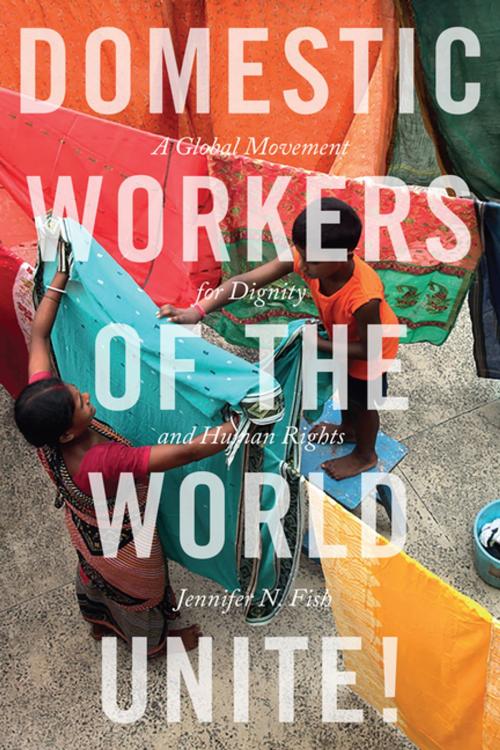Domestic Workers of the World Unite!
A Global Movement for Dignity and Human Rights
Nonfiction, Social & Cultural Studies, Social Science, Gender Studies, Sociology| Author: | Jennifer N. Fish | ISBN: | 9781479881437 |
| Publisher: | NYU Press | Publication: | July 25, 2017 |
| Imprint: | NYU Press | Language: | English |
| Author: | Jennifer N. Fish |
| ISBN: | 9781479881437 |
| Publisher: | NYU Press |
| Publication: | July 25, 2017 |
| Imprint: | NYU Press |
| Language: | English |
From grassroots to global activism, the untold story of the world's first domestic workers' movement.
Domestic workers exist on the margins of the world labor market. Maids, nannies, housekeepers, au pairs, and other care workers are most often ‘off the books,’ working for long hours and low pay. They are not afforded legal protections or benefits such as union membership, health care, vacation days, and retirement plans. Many women who perform these jobs are migrants, and are oftentimes dependent upon their employers for room and board as well as their immigration status, creating an extremely vulnerable category of workers in the growing informal global economy.
Drawing on over a decade’s worth of research, plus interviews with a number of key movement leaders and domestic workers, Jennifer N. Fish presents the compelling stories of the pioneering women who, while struggling to fight for rights in their own countries, mobilized transnationally to enact change. The book takes us to Geneva, where domestic workers organized, negotiated, and successfully received the first-ever granting of international standards for care work protections by the United Nations’ International Labour Organization. This landmark victory not only legitimizes the importance of these household laborers’ demands for respect and recognition, but also signals the need to consider human rights as a central component of workers’ rights.
Domestic Workers of the World Unite! chronicles how a group with so few resources could organize and act within the world’s most powerful international structures and give voice to the wider global plight of migrants, women, and informal workers. For anyone with a stake in international human and workers’ rights, this is a critical and inspiring model of civil society organizing.
From grassroots to global activism, the untold story of the world's first domestic workers' movement.
Domestic workers exist on the margins of the world labor market. Maids, nannies, housekeepers, au pairs, and other care workers are most often ‘off the books,’ working for long hours and low pay. They are not afforded legal protections or benefits such as union membership, health care, vacation days, and retirement plans. Many women who perform these jobs are migrants, and are oftentimes dependent upon their employers for room and board as well as their immigration status, creating an extremely vulnerable category of workers in the growing informal global economy.
Drawing on over a decade’s worth of research, plus interviews with a number of key movement leaders and domestic workers, Jennifer N. Fish presents the compelling stories of the pioneering women who, while struggling to fight for rights in their own countries, mobilized transnationally to enact change. The book takes us to Geneva, where domestic workers organized, negotiated, and successfully received the first-ever granting of international standards for care work protections by the United Nations’ International Labour Organization. This landmark victory not only legitimizes the importance of these household laborers’ demands for respect and recognition, but also signals the need to consider human rights as a central component of workers’ rights.
Domestic Workers of the World Unite! chronicles how a group with so few resources could organize and act within the world’s most powerful international structures and give voice to the wider global plight of migrants, women, and informal workers. For anyone with a stake in international human and workers’ rights, this is a critical and inspiring model of civil society organizing.
From grassroots to global activism, the untold story of the world's first domestic workers' movement.
Domestic workers exist on the margins of the world labor market. Maids, nannies, housekeepers, au pairs, and other care workers are most often ‘off the books,’ working for long hours and low pay. They are not afforded legal protections or benefits such as union membership, health care, vacation days, and retirement plans. Many women who perform these jobs are migrants, and are oftentimes dependent upon their employers for room and board as well as their immigration status, creating an extremely vulnerable category of workers in the growing informal global economy.
Drawing on over a decade’s worth of research, plus interviews with a number of key movement leaders and domestic workers, Jennifer N. Fish presents the compelling stories of the pioneering women who, while struggling to fight for rights in their own countries, mobilized transnationally to enact change. The book takes us to Geneva, where domestic workers organized, negotiated, and successfully received the first-ever granting of international standards for care work protections by the United Nations’ International Labour Organization. This landmark victory not only legitimizes the importance of these household laborers’ demands for respect and recognition, but also signals the need to consider human rights as a central component of workers’ rights.
Domestic Workers of the World Unite! chronicles how a group with so few resources could organize and act within the world’s most powerful international structures and give voice to the wider global plight of migrants, women, and informal workers. For anyone with a stake in international human and workers’ rights, this is a critical and inspiring model of civil society organizing.
From grassroots to global activism, the untold story of the world's first domestic workers' movement.
Domestic workers exist on the margins of the world labor market. Maids, nannies, housekeepers, au pairs, and other care workers are most often ‘off the books,’ working for long hours and low pay. They are not afforded legal protections or benefits such as union membership, health care, vacation days, and retirement plans. Many women who perform these jobs are migrants, and are oftentimes dependent upon their employers for room and board as well as their immigration status, creating an extremely vulnerable category of workers in the growing informal global economy.
Drawing on over a decade’s worth of research, plus interviews with a number of key movement leaders and domestic workers, Jennifer N. Fish presents the compelling stories of the pioneering women who, while struggling to fight for rights in their own countries, mobilized transnationally to enact change. The book takes us to Geneva, where domestic workers organized, negotiated, and successfully received the first-ever granting of international standards for care work protections by the United Nations’ International Labour Organization. This landmark victory not only legitimizes the importance of these household laborers’ demands for respect and recognition, but also signals the need to consider human rights as a central component of workers’ rights.
Domestic Workers of the World Unite! chronicles how a group with so few resources could organize and act within the world’s most powerful international structures and give voice to the wider global plight of migrants, women, and informal workers. For anyone with a stake in international human and workers’ rights, this is a critical and inspiring model of civil society organizing.















